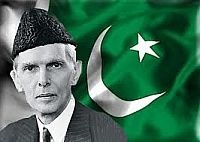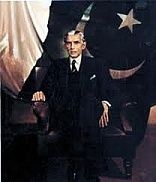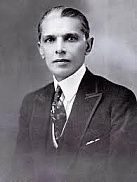
Fathers name: Jinnahbhai Poonja
Mothers name: Mitthibhai Poonja
Country of Birth:
Pakistan
Year of birth: 1876
Places of Residence:
Karachi
Brothers/sisters: Fatima, Shireen, Maryam , Ahmad , Rahmat, Bunde
Studies: Law
Profession: Lawyer

Muhammad Ali Jinnah was the first child born to Mithibai and Jinnahbhai Poonja in a Gujarati family in Wazir Mansion Karachi on December 25, 1876 .He was a lawyer, politician, statesman and the founder of Pakistan. He is popularly and officially known in Pakistan as Quaid-e-Azam ("Great Leader") and Baba-e-Qaum("Father of the Nation").His grandfather, Poonja Gokuldas Meghji,[21] was a Hindu from Paneli village in Gondal state in Kathiawar who had converted to Islam. Jinnah's family belonged to the Ismaili Khoja branch of Shi'a Islam,though Jinnah later converted to Twelver Khoja Shi'a Islam.The first-born Jinnah was soon joined by six siblings: three brothers—Ahmad Ali, Bunde Ali, and Rahmat Ali—and three sisters: Maryam, Fatima and Shireen. Jinnah was a great but restless student and studied at several schools: first at the Sindh-Madrasa-tul-Islam in Karachi; then briefly at the Gokal Das Tej Primary School in Bombay; and finally at the Christian Missionary Society High School in Karachi,[15] where, at the age of 16, he passed the matriculation examination of the University of Bombay.Before he left for England in 1892, at his mother's urging, he married his distant cousin—Emibai Jinnah, who was two years his junior;[15] she died a few months later. During his sojourn in England, his mother too would pass away.[20] In London, Jinnah soon gave up the apprenticeship to study law instead, by joining Lincoln's Inn. It is said that the sole reason of Jinnah's joining Lincoln's Inn is that the main entrance to the Lincoln's Inn had the names of the world's all-time top-ten lawgivers, and that this list was led by Muhammad.[20] This story, however, has no basis in fact. In three years, at age 19, he became the youngest Indian to be called to the bar in England.[20]
During his student years in England, Jinnah came under the spell of 19th-century British liberalism, like many other future Indian independence leaders. This education included exposure to the idea of the democratic nation and progressive politics.

Muhammad Ali Jinnah was the first child born to Mithibai and Jinnahbhai Poonja in a Gujarati family in Wazir Mansion Karachi on December 25, 1876 .He was a lawyer, politician, statesman and the founder of Pakistan. He is popularly and officially known in Pakistan as Quaid-e-Azam ("Great Leader") and Baba-e-Qaum("Father of the Nation").His grandfather, Poonja Gokuldas Meghji,[21] was a Hindu from Paneli village in Gondal state in Kathiawar who had converted to Islam. Jinnah's family belonged to the Ismaili Khoja branch of Shi'a Islam,though Jinnah later converted to Twelver Khoja Shi'a Islam.The first-born Jinnah was soon joined by six siblings: three brothers—Ahmad Ali, Bunde Ali, and Rahmat Ali—and three sisters: Maryam, Fatima and Shireen. Jinnah was a great but restless student and studied at several schools: first at the Sindh-Madrasa-tul-Islam in Karachi; then briefly at the Gokal Das Tej Primary School in Bombay; and finally at the Christian Missionary Society High School in Karachi,[15] where, at the age of 16, he passed the matriculation examination of the University of Bombay.Before he left for England in 1892, at his mother's urging, he married his distant cousin—Emibai Jinnah, who was two years his junior;[15] she died a few months later. During his sojourn in England, his mother too would pass away.[20] In London, Jinnah soon gave up the apprenticeship to study law instead, by joining Lincoln's Inn. It is said that the sole reason of Jinnah's joining Lincoln's Inn is that the main entrance to the Lincoln's Inn had the names of the world's all-time top-ten lawgivers, and that this list was led by Muhammad.[20] This story, however, has no basis in fact. In three years, at age 19, he became the youngest Indian to be called to the bar in England.[20]
During his student years in England, Jinnah came under the spell of 19th-century British liberalism, like many other future Indian independence leaders. This education included exposure to the idea of the democratic nation and progressive politics.



